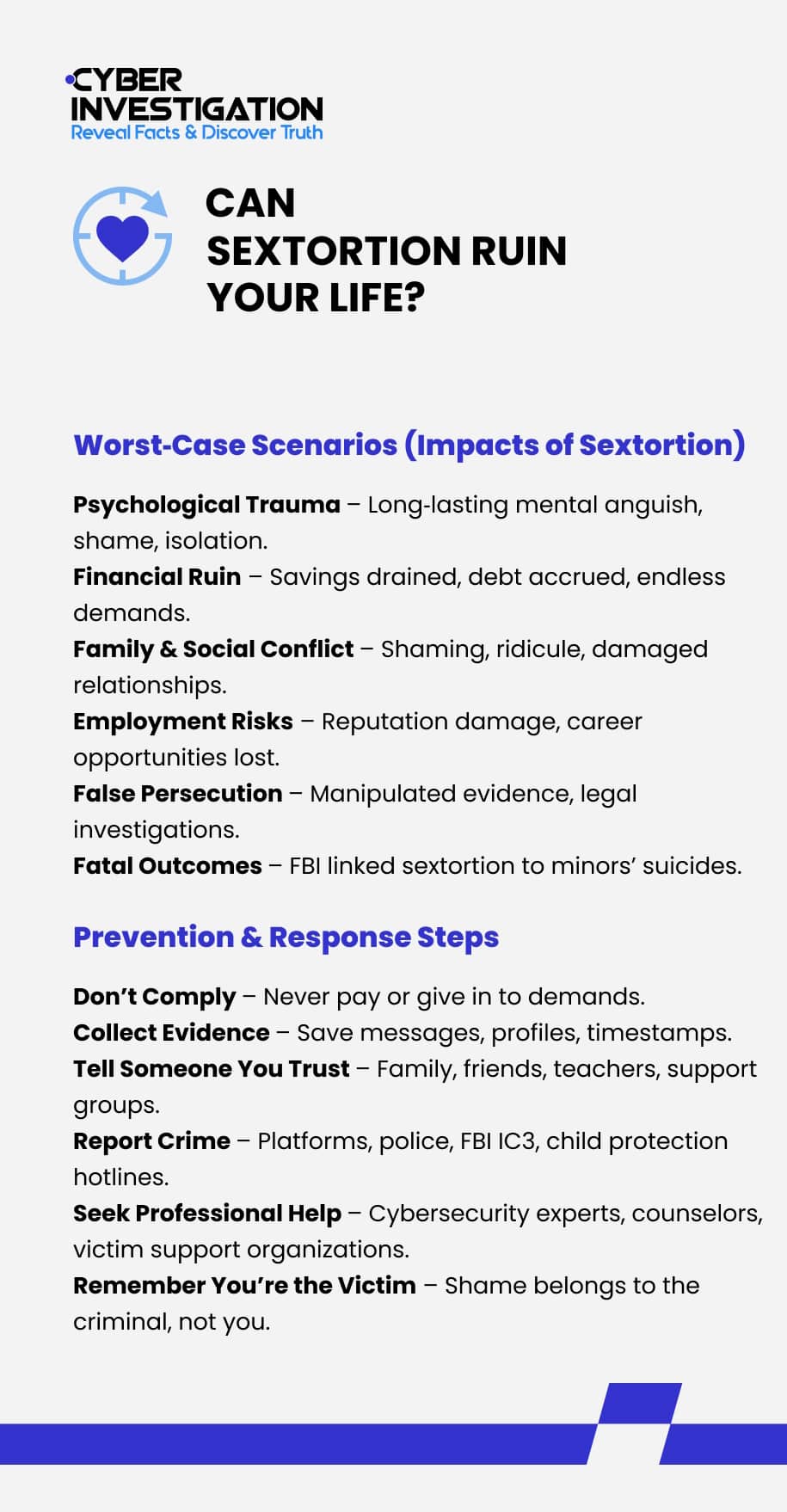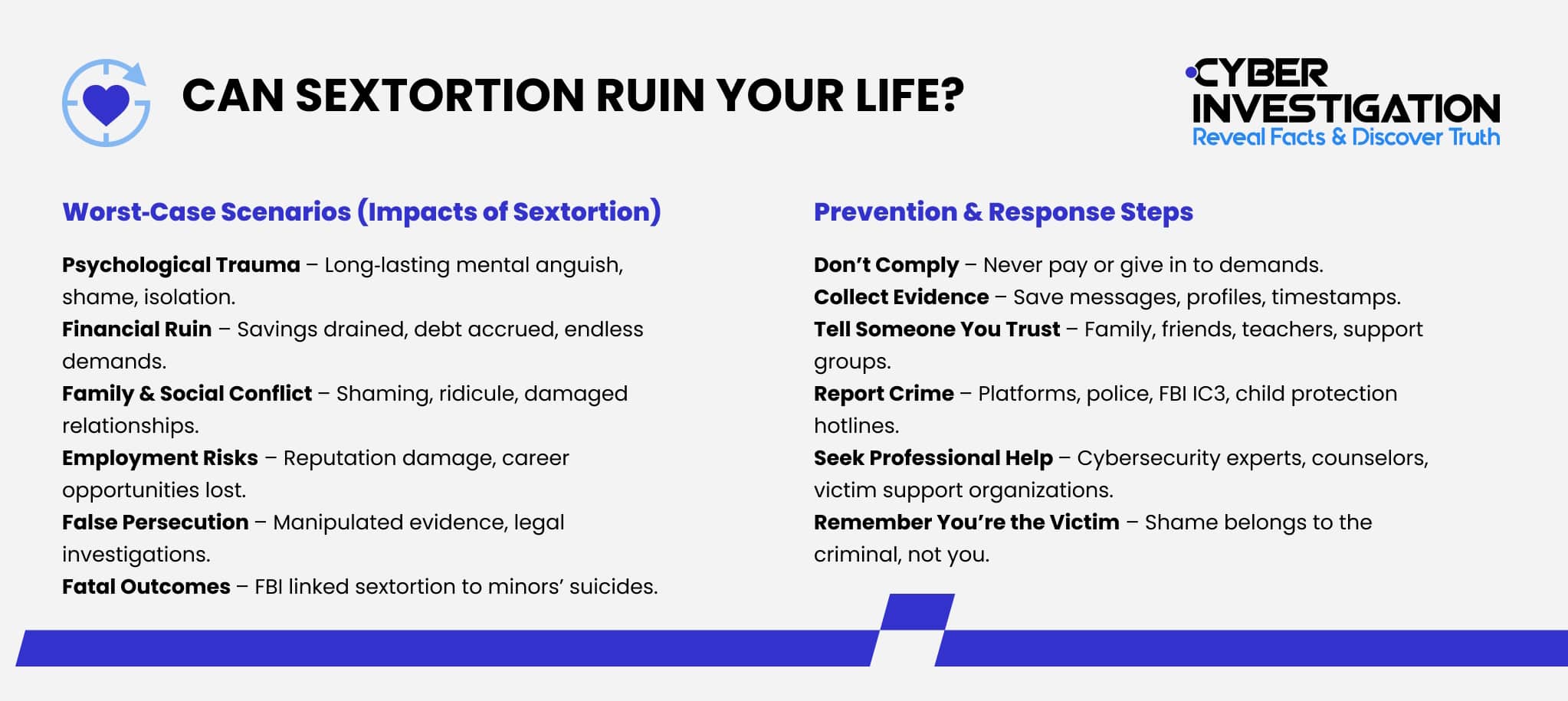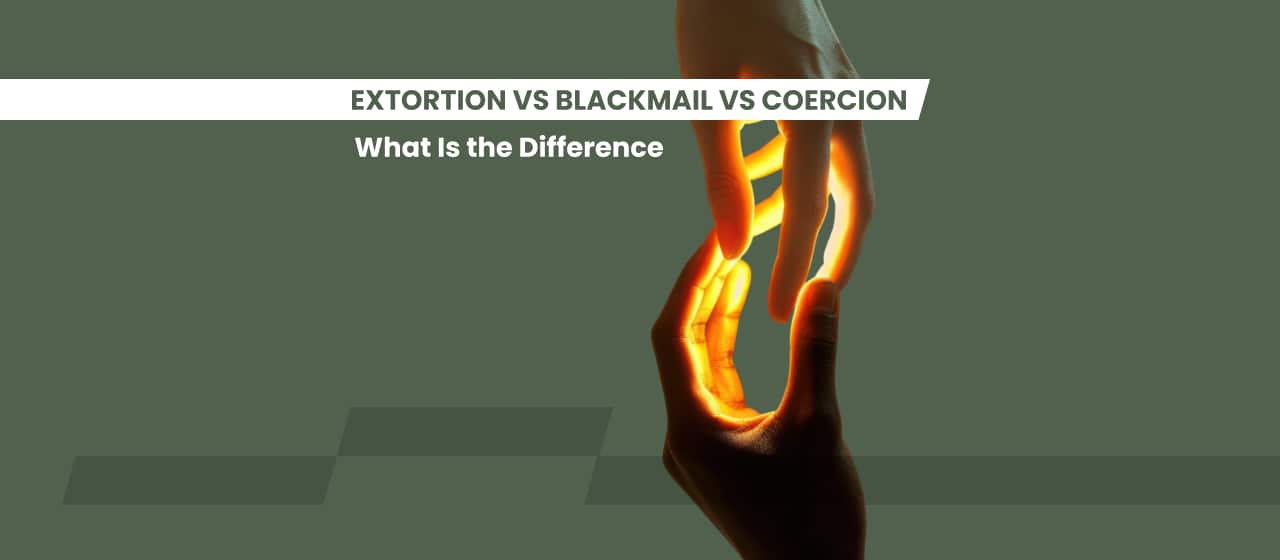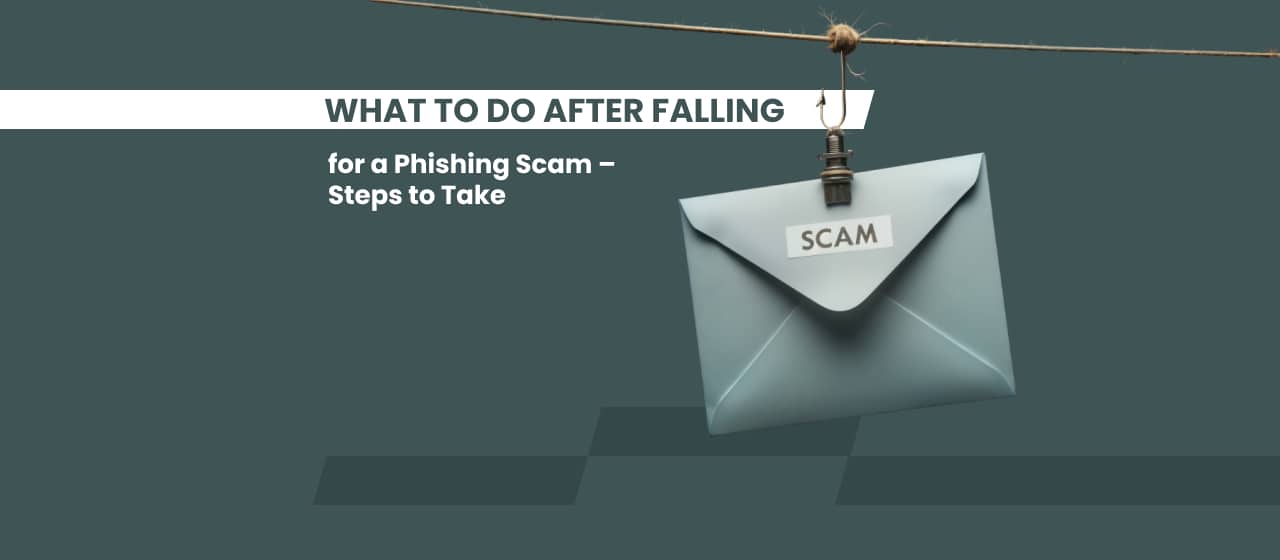“Send me the money or I will ruin your life.” This sentiment is often uttered by sextortionists trying to close the deal on their heinous schemes. But do these claims hold weight? Could sextortion actually ruin your life? They may possess images of your most intimate moments, but does that really mean that all hope is lost? For many victims, this is the only imaginable outcome — but it doesn’t have to be. Keep reading to learn more about the possible ramifications of sextortion and what you can do to prevent them.
Worst Case Scenarios: How Victims Believe Sextortion Could Ruin Their Lives
We do not want to raise unnecessary paranoia, but we also cannot downplay the ramifications of sextortion. Victims are often left severely harmed — financially and emotionally. It can cause irreparable damage to an individual’s ability to trust and operate socially. Here are some of the ways many victims fear sextortion can ruin their lives.
Lasting Psychological Effects
The mental anguish of sextortion can be long-lasting. These effects can be felt even harder by young victims who are still emotionally developing. According to a study by the National Children’s Alliance, one in four minor victims require professional mental health care. Over 12% relocated after their experience, and 45% were too ashamed to confide in family or friends.
Financial Ruin
Financial sextortion can devastate victims monetarily. Numerous cases have seen life savings drained, houses sold, and debt accrued to meet the perpetrator’s endless demands. This is a huge problem because once a victim pays, there’s nothing stopping the sextortionist from demanding more. This is why our experts recommend you never pay a sextortionist or any cybercriminal.
Shaming or Ridicule from Family and Friends
If victims are too embarrassed to inform their families, they definitely don’t want the sextortionist to contact them. This is one of the chief impacts online sextortion can have on your life. When sextortionists know your accounts on multiple connected platforms, they have a wider ability to distribute this media. If this occurs, it can lead to damaged personal relationships and even conflict with your friends, family, and colleagues.
Employment Risks
Aside from your personal life, sextortion also poses a threat to your career. If you’ve disclosed details about your employer or business operations, you’ve also exposed yourself to another avenue of release. Sextortionists may also reverse image search your photos to find you on job listing and networking platforms. Naturally, this leads to reputation damage that can affect your employment, as well as your opportunities down the line.
False Persecution and Potential Investigations
Some sextortionists really go the extra mile when it comes to besmirching your good name. They may turn around and claim to be underage after your exchange and threaten legal action. Some go as far as to digitally manipulate messages or create AI-generated news reports and wanted posters. Sextortion victims may find themselves trying to defend their good name when they themselves are the real victim. This may lead to official investigations should the material come to the attention of law enforcement bodies.


Real-World Examples
To get a better understanding of the potential ramifications of sextortion, let’s look at some examples from the past. Every case is unique, but we can look for factors that both helped and hurt the victims’ efforts. This is critical for developing effective response plans moving forward and helps spread awareness of this growing crime.
Cases Where Sextortion Ruined Lives
Before we delve into these cases, we’d like to make it completely clear that the victims were by no means at fault. Sextortion is illegal and inhumane. The perpetrator is always the one in the wrong, never the victim.
Unfortunately, the end result of sextortion can potentially be fatal. The chances of this conclusion are especially concerning in cases targeting minors. From October 2021 to March 2023, the FBI linked sextortion as the cause for at least 20 minors taking their own lives.
This isn’t simply the byproduct of the crime. It is an outcome that is often actively encouraged by the sextortionists. The majority of sextortion cases are littered with messages such as “do it, or I’ll make you do it,” and “I will make you wish you were dead.” Sadly, and to no fault of their own, many minor victims simply don’t have the emotional development to see any other options.
These individuals are often under intense scrutiny to keep up public appearances. Such was the case for Ryan Last, a 17-year-old high school student from Northern California. Ryan was a straight-A student, eagle scout, second- degree blackbelt in karate, and even a member of the FFA.
Ryan was messaged online by who he believed to be a 20-year-old woman. In reality, he was speaking with four men from the Ivory Coast. After sending a stolen nude photo and convincing Ryan to send one back, they dropped their façade. They immediately started demanding money and applying pressure with threats to send the content to Ryan’s family and friends.
Ryan was initially contacted by the sextortionists around 10 p.m. By 2 a.m., he had endured an unimaginable amount of distress and took his own life. In a note left behind, Ryan expressed his extreme embarrassment and belief he’d embarrassed his family.
“He really, truly thought in that time that there wasn’t a way to get by if those pictures were actually posted online,” Ryan’s Mother said. “His note showed he was absolutely terrified. No child should have to be that scared.”
Sharing Her Sextortion Story to Help Save Lives
Ashley Reynolds was just a freshman in high school when she received a random message on MySpace. The subject line simply read “I have naked pics of you, open this.” Knowing she’d never taken a nude photo, Ashley brushed it off. Over time, she began to worry. What if her webcam had been hacked? Eventually, she decided to respond.
The perpetrator demanded seven intimate photos from Ashley to keep her content private. Hoping he’d go away, she decided to comply. This began a 5-month span of nightly photoshoots. Ashley says this explained that the experience had stripped her of her innocence and dignity.
Eventually, Ashley’s parents checked in on her online activities and became privy to the situation. Her mother reached out to the National Center for Missing and Exploited Children, who were able to get the FBI involved.
Nearly a year after the initial message, the FBI tied the crime back to Lucas Michael Chansler. Chansler had sextorted over 350 minors from 2007 through 2010. He had approximately 80,000 pieces of CSAM material in his possession, and he was sentenced to 105 years in federal prison.
Ashley, through the help of her support system, was able to reach a positive conclusion to her sextortion case. Now, she advocates for sextortion awareness, sharing her story and starting a conversation that needs to be had.
How to Prevent Sextortion from Ruining Your Life
The most important factor in not letting sextortion ruin your life is remembering that you are the victim, not the bad guy. You’ve done nothing wrong by engaging in an online activity that the majority of the population has at some point or another. You should not feel too ashamed to ask for help. Relying on your support group is your best path toward recovery.
Our experts advise you take the following course of action to prevent sextortion from ruining your life:
- Don’t comply with the sextortionists demands.
- Collect evidence of the crime, such as contact information, messages, and timestamps.
- Tell a trusted person in your life (i.e. family, friends, teachers, or professional support).
- Report the crime to the online platform and law enforcement.
And if you’re faced with sextortion and don’t know where to turn, look no further than Cyber Investigation Inc. Our team of experts has the experience and resources to help you avoid the potential ramifications of sextortion. You can contact our Sextortion Helpline 24/7 to speak with one of our specialists and get started.







